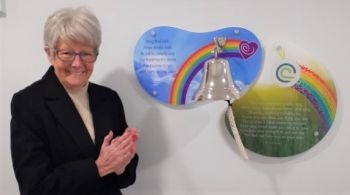Woman completes treatment in pioneering cancer research trial
Posted 26th February 2022

A patient with oesophageal cancer is hoping for a brighter future after finishing her treatment on a clinical research trial.
80-year-old Lorna Cheetham rang the end of treatment bell at The Clatterbridge Cancer Centre after a course of therapy for cancer of the oesophagus. She has been given chemotherapy and radiotherapy as part of the clinical trial and is now hoping the treatment will keep her oesophageal cancer in check.
Lorna is part of the SCOPE 2 clinical research trial, taking place at Clatterbridge Cancer Centre – Liverpool. She was given a mix of two types of chemotherapy – carboplatin and paclitaxel – combined with high doses of radiotherapy.
She had to travel to Clatterbridge Cancer Centre – Liverpool every day for five weeks from her home in Upton, near Chester, while she had the treatment and other procedures, including blood transfusions.
Lorna spoke about her treatment during Oesophageal Cancer Awareness Month, which highlights the disease, and said she noticed something was wrong when the gastric problems she had for a number of years worsened and swallowing became painful. Lorna was given an endoscopy last summer, which revealed a tumour in her gullet.
As part of her treatment, she was asked if she wanted to go on the SCOPE2 trial by her consultant who explained the nature of the study. He said it was a high intensity treatment, with a commitment to frequent visits and the possibility of side effects.
“I knew that the treatment would be quite gruelling as this had been outlined by the consultant but I was determined to go through with it,” said Lorna. "Being part of this clinical trial would give me a better chance of overcoming the cancer and if it did not benefit me, it could benefit someone else further down the line.
“But I was lucky, I didn’t have many problems with the treatment and my consultant is really happy with how I have coped with it all.”
Lorna’s husband, Roy, is also relieved with her good progress. Lorna said: “He was concerned about me at the beginning but he’s now very proud of how I’ve come through this.”
Lorna, a professional dog groomer who only retired five years ago, believes her good level of fitness before her cancer diagnosis helped her to cope with the treatment. “I’ve been lucky,” she said. “I used to walk five miles every day with Roy and I think that being fit helped me to get through the treatment more easily.”
Lorna, who will now be monitored with scans and other tests, recommends taking part in a clinical research trial if offered the opportunity.
She said: “I was keen straight away to go on the trial. It was bit scary at first but everyone explained things so well and the care from everyone had been so good that I didn’t have second thoughts. And I believe that if this research does not help me, then it will help other people. Research is the only way cancer treatment is going to become better.
“Clatterbridge looked after me brilliantly. The team were great and I made many friends during my treatment. I’m so glad I went there, the staff couldn’t do enough for me.”

Lorna’s lead clinician is Consultant Clinical Oncologist Dr
Chinnamani Eswar, who is Principal Investigator on the Scope2 clinical research
trial.
He said: “Lorna has coped extremely well with her treatment and we are
grateful to her for taking part in this study. The Scope2 clinical research
trial hopefully will help her and also other people with oesophageal cancer in
the future.”
Oesophageal Cancer is the ninth most common cancer worldwide
If you experience any of the below symptoms, you should contact your GP to discuss this further:
- If you’ve experienced heartburn for three weeks or longer
- If your heartburn persists even after avoiding trigger foods and changing your lifestyle
- If food gets stuck when you swallow
- If you experience persistent indigestion
For more information about oesophageal cancer, visit Guts UK's website
